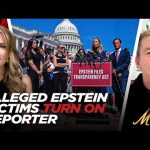In a bold move that underscores the seriousness of America’s battle against drug-related violence, Senator Marco Rubio recently declared war on what he calls “narco terrorists.” On a trip to Ecuador, Rubio designated two notorious gangs as foreign terrorist organizations, sending a clear message that the U.S. is ramping up its efforts against drug cartels. This declaration follows a notable military action in which U.S. forces targeted the Tren de Aragua, a dangerous Venezuelan gang, eliminating eleven members in international waters. It’s like something straight out of an action movie, yet it’s all too real.
These aren’t ordinary drug traffickers; they’re labeled as terrorists for a reason. They don’t just deal in illegal substances—they instill fear in entire nations. By classifying these gangs as foreign terrorist organizations, the U.S. government is now armed with the ability to apply various forms of pressure, including economic sanctions and military action. The impression is that the gloves are off and America is prepared to deal with these dangerous groups decisively.
Strategically, the U.S. recognizes that a considerable demand for illegal drugs exists domestically, while the supply chains run through Latin and South America, particularly from Venezuela. With a regime that benefits financially from narcotics trafficking, the stakes are incredibly high. By disrupting these supply lines—especially through naval patrols in the Caribbean aimed at shutting down maritime smuggling—U.S. forces are sending a strong signal to would-be traffickers: enough is enough.
The operations in the region are extensive, showcasing a formidable fleet that hasn’t been seen on this scale for a long time. These naval assets are dedicated to intercepting vessels believed to be transporting drugs like fentanyl, which pose an enormous threat to Americans. Although intercepting drugs at sea is not a simple task, the administration appears committed to making it a priority. Moreover, this operation reflects a larger strategy to consistently combat the flow of drugs into the United States, targeting their transportation routes directly.
The urgency of this issue extends beyond the borders of Venezuela and into every community in America. While military operations play a crucial role, it is suggested that the responsibility also lies with parents, teachers, and kids themselves. Education about the dangers of drug use is vital, especially when many young individuals may unknowingly consume substances that could ultimately threaten their lives. The fight against drug abuse is a collective effort, and everyone has a role to play.
To wrap it all up, the U.S. is making it clear that it will not tolerate the actions of those who profit from the suffering of others. By pushing for regime change in Venezuela and targeting drug trafficking networks with military might, the administration is embarking on a tough but necessary path. Making strides against these threats is crucial—not just for national security, but to ensure that future generations can thrive in a safer, more secure environment. Still, it remains to be seen how effective these measures will be in the long run.




